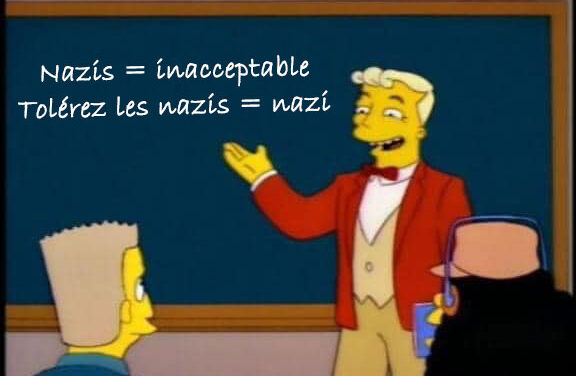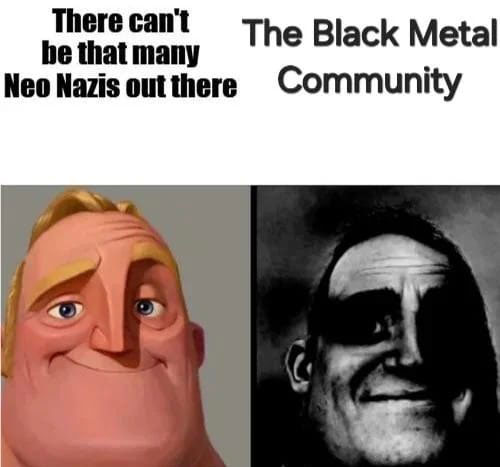
“If you are at a table with a Nazi, and ten other people are hanging out with him, you have a table of Nazis”
This dictum may sound like a joke, but the idea it expresses is nonetheless poignant, accurate, and relevant. We are firmly convinced that the contagion effect of complacency in the face of the most reactionary, racist, and hateful far-right currents can only pollute any environment where they are tolerated.
That’s why, a few weeks ago, we launched a campaign to denounce and have cancelled the presence of several NSBM (neo-Nazi) bands booked to play the 2024 edition of the Messe des Morts black metal festival, organised by the Sepulchral Productions label and its main manager, Martin Marcotte.[i] The campaign will culminate in a demonstration on November 29 at 6:00 p.m., in front of the Théâtre Paradoxe, 5959 boulevard Monk, in Montreal.
Since the publication of our dossier on these bands on October 27, we’ve received an outpouring of outraged comments from black metal fans who, following a well-known script, accuse us of demonizing or seeking to “cancel” the entire milieu. For the most part, what these reactions have in common is a complete disregard for essential issue at hand and the use of all sorts of fallacious arguments to defend tooth and nail the countercultural milieu in question.
To be perfectly clear, we aren’t criticizing this milieu for being fundamentally neo-Nazi—we don’t, and we never have, regardless of our critics claims. What we do criticize is the fact that the black metal scene is too tolerant of the neo-Nazi elements that persist within it, as shown by the presence of at least four bands with greater or lesser links to NSBM in the 2024 line-up, including the headliner, the Swedish band Marduk, which cultivates a profound ambiguity in this respect.
The purpose of this post is to respond to our critics and to once again invite all black metal fans to take measures to clean up their scene once and for all.
///
On 20 November 2024, Radio-Canada ran the headline “Saluts nazis et croix gammées au Bas-Saint-Laurent, des actes “inquiétants” [Nazi Salutes and Swastikas in Bas-Saint-Laurent, “Disturbing” Acts]. The day before, the trial of Patrick Gordon Macdonald, aka “Dark Foreigner,” a propagandist linked to the neo-Nazi network the Atomwaffen Division, began in Ottawa. The previous week, neo-Nazi militants unfurled a banner in Hamilton, Ontario, calling for the “mass deportation” of immigrants. The same week, in the wake of Donald Trump’s election in the United States, a neo-Nazi groupuscule paraded through the streets of Columbus, Ohio, waving swastika flags.
We’re not talking about the 1930s, or the 1980s, but November 2024, in Québec, Canada, and the US. It would be facile in the extreme to pretend that fascist movements don’t present a real threat today. For at least a decade, the populist right has been on the rise in many parts of the world, and in its wake, the far right has been rearing its ugly head, with a constant parade of fascists and far-right supremacists of all stripes.
This is the alarming context of our campaign to denounce the Messe des Morts.
It’s an established fact that neo-Nazi NSBM current has always had a parasitical relationship with black metal. It’s not always openly displayed in this milieu, but it persistently permeates it, and, above all, it is widely tolerated. Elements of the black metal scene that explicitly condemn and reject the neo-Nazi movement (such as the Black and Anarchist Black Metal movement) are the exception.
The most common approach to denouncing this reality is the one we’ve seen over the past few weeks: a superficial reaction characterized by categorical denial and inordinate defense of the black metal milieu. As the type of music they love forms a central part of their identity, fans “take it personally”: they’re black metal fans, and they’re not personally Nazis, ergo, black metal can’t be Nazi. What we’re talking about, however, is not the adherence of this or that fan of the genre to the principles of National Socialism but the complacency toward the NSBM subgenre that runs through the milieu.
We routinely encounter the same basic handful of arguments, which together form a sort of circular reasoning:
- It’s just not true!
NSBM as such, or its alleged influence within the black metal milieu, is some kind of myth perpetuated by “communists” and other “bad people.” This is the easiest position to refute. NSBM is unquestionably one of the constitutive currents of black metal, and has been since the very beginning of the genre.
- NSBM does exist (somewhere else. . .), but here it’s a negligible phenomenon, or at least it’s non-existent at Messe des Morts, which is above suspicion.
According to this line of argument, NSBM is a hyper-marginal phenomenon, best ignored altogether. As always in such cases, we strongly contest this ostrich approach. The NSBM current may be in the minority in its explicit expression, but its implicit “cultural” presence in the milieu is chronic and its influence widespread. The presence at the festival of three or four groups with notoriously suspect associations and/or dubious obsessions with Nazism—not unlike the inclusion of Graveland in 2016—testifies to the fact that links with NSBM, and cryptofascism in the case of Marduk, are never far away at the Messe des Morts. We also know that Martin Marcotte, the main person behind Sepulchral Productions and the promoter of the Messe des Morts, distributed NSBM material in the 2000s, as well as organizing shows with neo-Nazi groups. To the best of our knowledge, Marcotte and Sepulchral Productions have never issued a retraction, publicly denounced the neo-Nazi current in black metal, or taken an official anti-racist stance, which would, at the very least, have the effect of redressing the current ambiguity. Vague claims that the event is “apolitical” just don’t cut it.
- It’s true that there are more or less Nazi elements in the milieu, but “you don’t understand,” that’s part of the genre’s codes; it’s a culture of transgression, and, for the most part, it’s “not political.”
The NSBM elements in the scene should, thus, be seen as entirely folkloric and strictly meant for “shock value.” This is an absurd position. Any event or environment where Nazi elements are tolerated is by definition political. To paraphrase the African-American activist Angela Davis, in a milieu notoriously teeming with neo-Nazis, it’s not enough not to be a Nazi; you have to be actively anti-Nazi. Otherwise, there will be no reason not to always suspect the milieu of complacency and complicity. The cultural manifestation defense does not hold water: culture and politics are, in fact, inseparable and often consubstantial.[ii] Any claim to apolitical status on the part of cultural or countercultural movements must, therefore, be taken with a grain of salt.
- It’s true that there are Nazis, but that’s “no big deal”; it’s “their right.”
Do we really need to explain what a pile of shit this argument is? Fascism, and a fortiori Nazism, are not ideas like any other. They are hateful ideologies that have a concrete effect on the lives of the targeted people and groups and when they succeed have absolutely catastrophic consequences. History leaves no room for question. It’s perhaps not surprising that a musical genre that cultivates a fascination with the morbid should revel in both the occult and the “evil” aspects of Nazism, but, in this case, there’s a fine line between morbid fascination and complacency. And it’s precisely this complacency that we reproach the black metal milieu for.
- It’s “just music”; I listen to NSBM, but that’s just a matter of taste and a question of individual freedom; it doesn’t mean I’m a Nazi.
We seriously doubt that. You need to take a good long look at yourself if you like music that promotes genocidal thinking and glorifies the actions of the Nazis. In any case, you shouldn’t be surprised that anti-fascists consider you to be part of the problem. Freedom of expression is not and must never become a smokescreen for the promotion and trivialization of hateful ideas. This, of course, is what the new far-right populists are trying to do at the moment,[iii] using this defense, combined with misinformation and confusionism, to promote the worst reactionary reflexes in the mainstream, which, obviously, favors their political advance. We shouldn’t fall for it.
- Anyway, anti-fascists are far worse (and far more violent); you say you’re anti-fascists, but you’re the real fascists!
Some commentators have used personal anecdotes of altercations to try to demonstrate that anti-fascists are, on the whole, eminently violent beings who seek only to intimidate and repress anyone who doesn’t think like them. It’s a well-known ploy. It’s easy and convenient to decontextualize isolated incidents to deflect the conversation and avoid addressing the problem. It’s no secret that anti-fascists seek to “cancel” Nazis. It’s even part of their job description. In this instance, what we have asked of the management of the Théâtre Paradoxe, and indirectly of the promoter of the Messe des Morts, is to remove from the bill the three groups examined in our article (plus the one identified by Pivot in an article addressing this polemic). We’re not necessarily seeking to have the entire festival cancelled (although, at this stage, the problem seems to be ubiquitous), but primarily to encourage self-examination within the black metal community. We remain committed to this goal.
Clearly, given the reaction to our campaign denouncing the Messe des Morts, bad faith is as much a part of this subculture as confusion and complacency. All too often, its followers go to considerable lengths to ignore, or at least deny, the problematic nature of the elements reported.
To return to the quote that opened this piece: if you’re at a party where a neo-Nazi advertises his presence, and everyone tolerates him being there, puts up with his antics, and does nothing to actively exclude him, you’re, in fact, at a Nazi party. This is all the more true if the bands hired to entertain the party have had Nazi members, have played with Nazis, have bought Nazi propaganda articles from Nazi websites, and specialize in songs glorifying Nazi exploits. And if the party organizer himself has already distributed music by Nazi artists. . . Are you starting to see the pattern here?
There is a way out. It would be entirely possible for these groups, events, promoters, and even the fans of the genre who all get lumped together to take a clear and unambiguous stand against any hateful ideology, including racism and antisemitism, sexism and homophobia, and in particular fascism and Nazism. Such a public stance would remove any ambiguity. There would, of course, be consequences to such a statement of principles—the genre’s NSBM adherents would no doubt feel betrayed—but that is the price to be paid to clean up a countercultural milieu that would be better off not permanently dragging around this ball and chain.
It can be done, and it has been done. In the 1980s and 1990s, the neo-Nazis tried to leech onto the punk and skin counterculture, and the community mobilized to completely and permanently exclude them. It wasn’t always smooth sailing, but, even today, these elements are systematically ostracized, and the boneheads still have to hide and play circle jerk.
This is an invitation to take a stand and clean up the scene once and for all. To do so, you have to take off the blinders and face the problem head-on.
Will you rise to the challenge?
[i] Also see the article by the independent media outlet Pivot: https://pivot.quebec/2024/11/15/le-collectif-montreal-antifasciste-denonce-un-festival-de-musique-black-metal/
[ii] It’s becoming increasingly clear that political transformations proceed from cultural transformations, and that the political developments we’re seeing today—the rise of the right and the far right—are the result of patient manipulation of mass cultural codes by skilled ideological actors over the last several decades.
[iii] Among the weapons used by these ideologues (think Trumpism and Elon Musk) are disinformation and confusionism, the method of deliberately blurring the meaning of words and political concepts to confuse and undermine people’s sense of reality, thereby encouraging them to buy into various conspiracy fantasies and the false solutions promised by demagogues. Another of their favorite weapons is “gaslighting,” a form of mental manipulation that involves misrepresenting or distorting information in such a way as to make people doubt their perception of reality. One of the main challenges facing us in the post-truth era is precisely to combat the perverse effects of these stratagems on the political sphere and on society in general.




